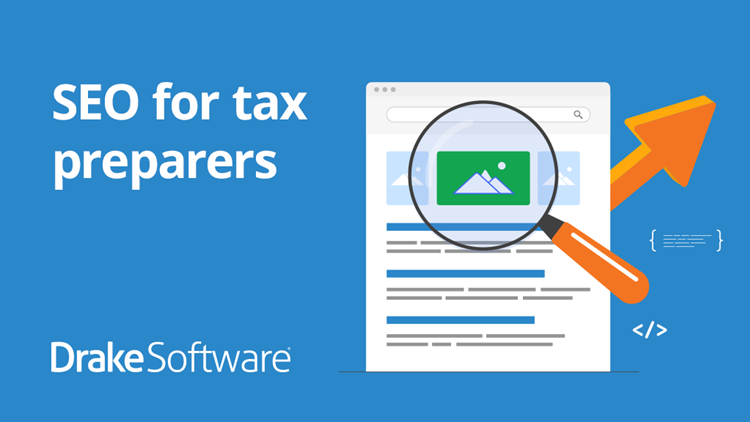SEO for Tax Preparers

Five tips to market your tax preparation business utilizing search engine optimization
It goes without saying—tax preparation is a highly competitive field. While there are many ways to stand out, one that’s often overlooked is search engine optimization, or SEO. Why? Because it’s not always the easiest concept to grasp or implement. But the truth is, it doesn’t have to be complicated. We're here to break down a few key ideas you can start using right away to help rise above the competition.
What is SEO and why should it matter for tax professionals?
Search Engine Optimization (SEO) helps organizations increase visibility in unpaid search engine results, driving more traffic and exposure. However, with over 150 search engines—each using different ranking systems—and constant updates to prevent manipulation, SEO is complex.
With a large amount of tax websites competing for attention—and constant changes to search engine algorithms—it's crucial to have a strategy that goes beyond just having a website. Strong SEO allows you to:
- Reach new clients actively searching for tax help
- Build credibility in your local market
- Improve website traffic
Even if you’re not ready to hire an SEO agency, there are a few core steps you can take to get started.
Tax Firm SEO Tips:
1. Optimize your tax services on your website
Start by identifying what sets your service apart. Do you offer a unique specialty? Focus on a specific local area? Highlight what makes you different—this should be clearly reflected on your website. Once that’s in place, strategically incorporate relevant keywords to boost your visibility in search results.
2. Use effective tax specific keywords
For example, if you specialize in helping small businesses with tax filing and maximizing savings, those phrases should be featured prominently throughout your website. This not only helps search engines understand what you offer, but also reassures potential clients that they’ve come to the right place.
Pro Tip: To attract the right audience, use keywords your ideal clients are typing into Google.
Examples can include:
“Tax filing for freelancers”
“Tax preparer in [your city]”
“IRS audit assistance for small businesses”
- Add keywords naturally in your page titles, headers (H2s), and paragraph text.
- Don’t overstuff—Google penalizes sites for that.
- Use tools like Google Keyword Planner or Ubersuggest to find high-volume, low-competition terms.
For deeper insight into the most effective approaches, check out this article on mastering marketing strategies for tax preparers.
3. Make your tax firm content information easy to find
For instance, put the your address at the bottom of each page.
Include your firm’s name, address, phone number, and email (NAP data) in the footer of every page. This helps with:
- Local SEO—making sure you show up on Google Maps and local searches
- Building trust with users
- Improving your ranking for “near me” searches
Pro tip: Your NAP data should match exactly across your website, Google Business Profile, and any online directories.
4. Collect and use referrals.
Backlinks—links from other reputable websites—are like votes of confidence in your site.
For tax professionals, some of the best backlinks come from:
- Local chambers of commerce
- Accounting or legal partners
- Industry blogs or publications
Ask satisfied clients or partners to link to your site. Even a few high-quality backlinks can boost your rankings significantly. If you're curious how other pros are finding success, review the Business Growth Survey results to see what strategies are driving results.
5. Design is important—but content is king when it comes to SEO.
Consider creating blog posts or FAQ pages on topics like:
- “What tax deductions are available for freelancers?”
- “How to prepare for an IRS audit”
- “Estimated tax payment deadlines for 2025”
New content shows search engines your site is active and informative—and keeps visitors engaged. Plus, high-quality content plays a key role in client satisfaction and retention, helping you build long-term relationships.
These five steps form the base of a solid SEO strategy for your tax business. As your business grows, you may consider investing in more advanced tactics like:
- Hiring an SEO consultant
- Running a paid keyword campaign
- Creating structured data for better search results
But with the foundation in place, you’re already ahead of many competitors. Every small improvement helps search engines—and new clients—find you.
Get ahead! Learn more ways to market your tax business. Download our free Business Growth Results where you’ll learn how other tax pros grow and market their firms.
Ready to explore robust tax software to help your business grow? Sign up for a free Drake Software demo. You’ll learn why more than 70,000 tax professionals nationwide trust Drake.



